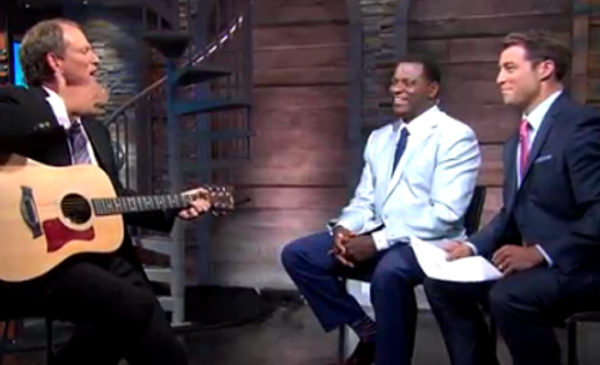From a journalistic perspective, blogs have helped uphold some of the tenets of journalism. In theory, journalism and blogging are working together to push sports toward a state of equilibrium in coverage.
Major news outlets can no longer get away with bad practices because many bloggers were able to prove journalistic malfeasance. Non-traditional outlets act as an IRB of sorts.
The filtration system of the internet is a modern marvel and fighting against it is fighting against progress. It’s here to stay and people are only going to get more familiar with it. The flip side of that coin is that they’re going to catch on to all the little tricks that major media outlets have been doing for years and they’re going to call them out on it. Before blogs and the internet, how many outstanding journalistic pieces went unsourced because major media outlets like ESPN refused to cite?
@Lahlahlindsey ESPN is the worldwide leader in vague sourcing
— Marc Normandin (@Marc_Normandin) January 5, 2016
How many journalists had broken significantly major stories only for America to refer to it as “a story on ESPN?” What is the likelihood that major media outlets would have pushed for proper sourcing without the help of the internet?
Remember, these were established practices before the internet came along, so it seems academically impossible that bloggers brought them into the mix. If the industry is headed for a renaissance, it’s largely because its own outdated practices are working against current accepted social norms.
And, bringing this full-circle to our self-appointed J-School professor, Mr. Whitlock: Howard’s reporting — a fundamental tenet of journalism — brought life to Deadspin’s articles on the failed “The Undefeated” venture.
In many ways, people are actually encouraging more intellectual thinking by posting their thoughts in a public space.
The ivory towers of academia and journalism are not the limits of intellectual thought. In fact, the very idea that they are goes against the entire scientific process.
Speaking sociologically, blogging is functional in that it fills a societal need correlating with societal norms. In other words, bloggers speak to the rabid sports fan, and the ratings and revenue sports generate support passion for these games as societal norm. Denying the source’s value because he/she may or may have traditional experience is tantamount to dismissing one of the largest theoretical models of social behavior available to academic thought.
How or why we choose to let someone influence our perspective says as much about our own intellectual constraints as anything we could write. Throughout history, the greatest exchange of ideas have come through intelligent discourse and discussion. What sense does it make to direct one flow of ideas into the garbage if the true aim is higher thought?
At the very minimum, it seems odd to allow athletes to influence an opinion but deny readership the same opportunity. Even more contradictory to higher thought is the idea the athlete needs a journalist to defend themselves, but the journalist should be above attack from those reading their work. It’s a very bourgeois thought process and requires a bit of an ego to put forth with a serious face. Those with money and fame need a platform for defense, but those intended to digest the information should do so quietly or with an editor’s permission.
The backbone of intelligent thought isn’t experience, it’s the ability to reason and sift through information while contributing to the advancement of thought in their respective fields. This can be achieved through a variety of methods, though experience is a valuable resource.
Appeals to authority have no place in logical discourse and this applies to journalists as well as anyone else. Logic, reason, and the scientific method are accepted societal practices and help to provide the foundation of Western civilization.
The Hegelian Dialectic comes into play when you talk about bloggers versus journalist, almost literally. Pitting journalism school against the varied disciplinary experiences brought to the table by the blogging community is taking away from the real discussion of intelligent thought, and conversations stall out. The creation of an “us versus them” dynamic can only serve to move the practice away from intelligent thought because talk of higher thought cannot be accompanied by oppressive action if society is to gain a better understanding of the issue.
The absence of academic thought in collegiate sports is something that should have been addressed long before now. The long-standing model of the NCAA has seemingly collapsed under the weight of reasoned thought and many great minds have contributed. Some of them had degrees in journalism, others had degrees in economics or policy. The results just seemed to come about more quickly after the responsibility for reporting on these matters were taken up by those who weren’t accomplished.
As the industry moves and shifts into the new age of technology and information, there will undoubtedly be people left behind. Some of it will be for the better and some of it will be a step back, but such is life. There are no guarantees in any field, and much of what we experience will be done together, as a collective. There are no gatekeepers to information any longer and that’s not a bad thing. At our core, we are nomads, wanderers, inventors and explorers.
Society has been trying to find a way to expand outward since it first discovered it could move. When it comes to intelligent thought and the boundaries of human capability, we are in relative infancy if you consider that the Age of Enlightenment only began around 400 years ago, even by the conservative estimates. Now you factor in the Age of the Internet and you’re dealing a with host of unknown, unforeseen, and unimaginable consequences. By themselves, consequences are inherently neither good nor bad, they just are.
So it is with blogging. It’s neither good nor bad, it just is. It’s up to intelligent people to figure out where these blogs fit in the growing database that is the web. The only way we can reach a general consensus on that subject is to put the content up for fair and reasoned scrutiny. If the basis for our argument is a simple appeal to journalistic authority, then the conversation has already begun on an illogical note.
In short, if you’re getting left behind in the Information Age, it’s likely because your information was found wanting. It’s not because of an imagined war on journalism.
















